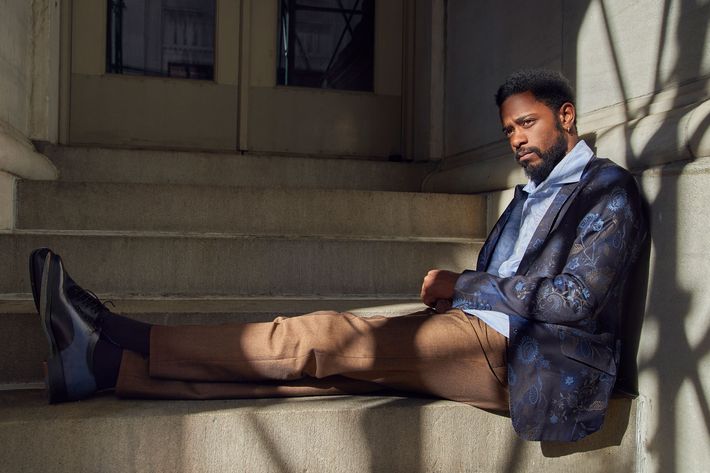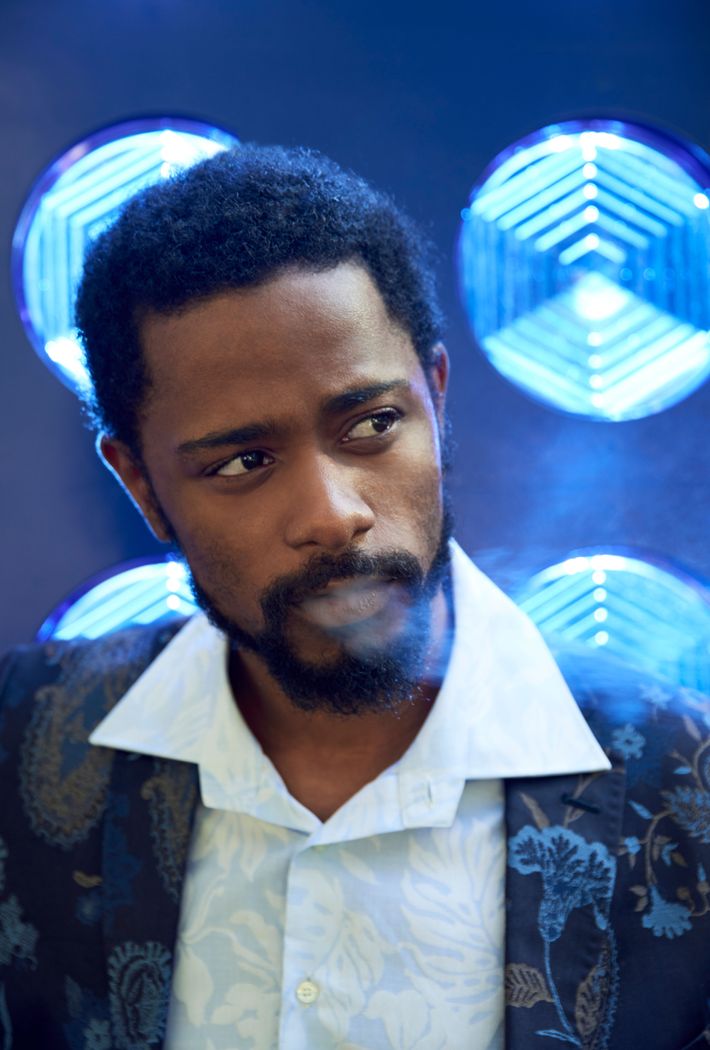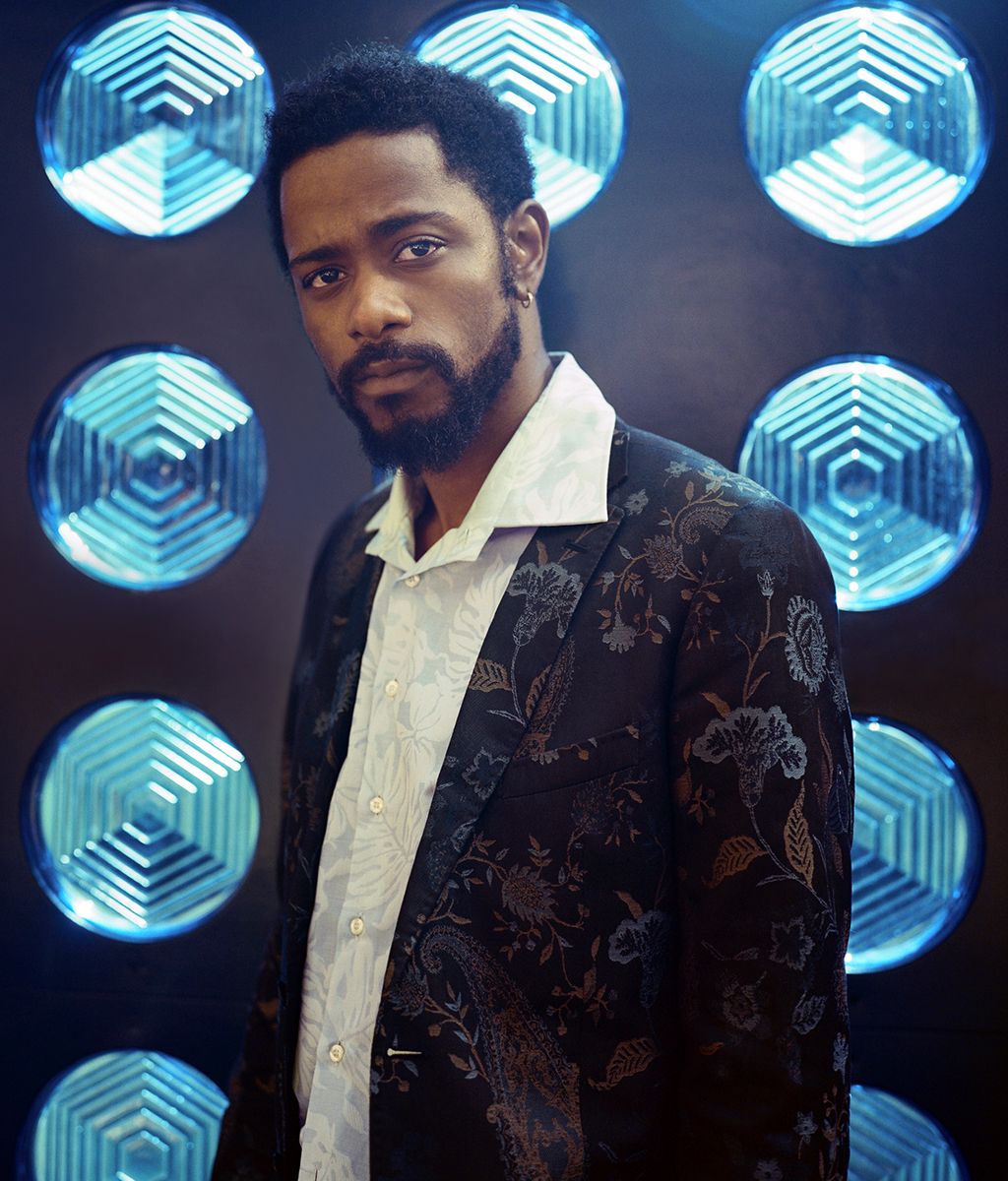While the reviews have been middling for Netflix’s adaptation of the classic manga series Death Note, one thing that’s clear is its star, Lakeith Stanfield, thinks the movie is both bad and good. Or maybe it’s so bad that it’s good. Anyway, just an hour before we meet at his hotel in New York, Stanfield dashed off in a now-deleted tweet: “WE WILL RISE TO THE TOP OF BAD FILMS OF 2017 ABD YOU WILL ALL BOW IN AWE” [sic]. When I see him in person, I ask if he likes the movie. “I love it,” he laughs. “And it’s also the worst movie of 2017!”
Don’t misunderstand: He’s kidding. Sort of. (If you’ve seen the movie, which is deeply silly, his Twitter review seems exactly right.) Really though, Stanfield is just trying to take the piss out of celebrity, asking us not to take him — or Hollywood — too seriously. “We learn more from what we don’t fuck with than what we do fuck with,” he says after we’ve settled on some beige couches at the hotel bar downstairs. “Sometimes, as actors, we sit up and we don’t have no fucking answers. And it’s important that we point that out: I’m a stupid human, just like you are. I’m not the fucking messiah, I’m a goddamned actor!”
Stanfield is in New York City for the week doing double-promotion duty for the aforementioned Death Note where he plays the mysteriously named “L,” a savant criminal investigator with a candy addiction, and Crown Heights, a biopic that tells the story of Colin Warner, a real-life Trinidadian-American man who spent 21 years in prison for a crime he didn’t commit. Together, the two films showcase Stanfield’s range as an actor: He gives a highly compressed, internalized performance as a man buffeted by systemic racism and institutional indifference in Crown Heights, and an exuberant, physical one in Death Note, where he crouches on chairs and talks in a slight staccato.
Stanfield’s press forays have run the gamut too, including a “bonkers” GQ interview in which he deadpanned one-word answers, sober Q&As alongside Warner himself, and red carpets where he wore something he imagined L himself would wear. (He also says that he hopes to one day wear an outfit that is, spiritually, like a “baby dragon.”) For Stanfield, the interview process is about getting what you give. “I don’t understand what’s in it for [reporters] if you’re just going to ask like, what I’m playing,” he says. “It makes me respond in that way like, Okay, you’re making me say this. Makes it lame and not that interesting. I like to feel there’s a human behind it, and not just a robot.”
Right now, sipping on a Jameson and ginger, he’s clearly enjoying the chance to talk about craft and opportunity. On the latter front, it’s been a good year for Lakeith Stanfield. Since breaking out as Darius in Donald Glover’s warm and surrealist FX series, Atlanta, in 2016, Stanfield has skipped around genre, time period, and character type. This year alone he’s played Corporal Billy Cole in War Machine, black Chandler in Jay-Z’s “Moonlight” music video, the hard-to-get-over boyfriend in Netflix’s The Incredible Jessica James, and a victim of a body snatcher in Get Out, in addition to his leading turns in Crown Heights and Death Note. And soon, he’ll star in Come Sunday about televangelist Oral Roberts and a magical-realist film about telemarketers in Sorry to Bother You.
For Crown Heights in particular, he feels the weight of responsibility bearing down on him. Stanfield met with Warner as part of his research process, and wanted to do justice to his experiences. “[Warner] talked and talked, and I extended my antennas and took it all in,” says Stanfield. “It doesn’t feel like talking about ‘a movie’ to the press in the same way. I want people to go see it just for him and his fucking family. I don’t care about the other shit.”
Like his breakout role in 2013’s Short Term 12 as Marcus, a teenager stuck in a state-run group home, Crown Heights gives him a sense of greater purpose. But these are the roles that also get inside his head. “I still feel there are parts of me that aren’t the same having played both [Colin] and [Marcus]. Sometimes I have weird dreams and shit. Last time I had one about being pursued by men and locked in a cell,” he says. “You have to create a balance because you want to be mentally stable enough to work, and you can easily slip into it, because the world’s fucked up. You can go to those places and realize how fucked up it is, and jump in those rabbit holes and not get out of there.”
But maybe that’s what roles like Death Note are for. When I ask him whose name he thinks L writes down in the “Death Note” — something left ambiguous at the end of the film — he turns sanguine and bemused. “It’s a very emotional scene. I don’t really remember,” he laughs. “All I know is I drew a line, you know? Crazy!”

He won’t call it method, but Stanfield slips into a different state when he’s in character. When he plays Darius, his high-chill pot philosopher character from Atlanta, he zones out. “What I do is I blank out my mind. I have nothing in my head when I step on set,” says Stanfield. “I can barely remember my line, and I’m immersed completely in the moment, so whatever happens is gonna happen. I’ve always thought about my character and his relationship to the story in that way. I don’t even know what Atlanta’s about. It doesn’t even mean anything to me!”
What it does mean is that he riffs a lot of his lines, and that happens frequently with his scene partner, Brian Tyree Henry, who plays Paper Boi. A scene where Darius is cleaning his gun and calling it “Daddy” was one of those moments. “We just fucking riffed it, man! I love the way that they are so in tune with the creative aspect that they just leave us alone, let us go, and shit just happens. And I was trying so hard not to laugh in that fucking scene,” says Stanfield. “Hiro [Murai, who directs many of the episodes] never says Cut! Once he says Action! and we start going, he just sits there chuckling.”
Unlike Darius, Stanfield says he quit smoking weed nine years ago (so you should probably stop gifting him pot). “I had to give up the old pipe,” he says. “When I smoked weed, I just got super-philosophical to a point where I was detached from everything. It could make me depressed, because I would feel that all this shit is so melancholy and sad, and it’d get me in a sad state.”
He hasn’t gotten the scripts yet for the second season of Atlanta, which is set to start shooting in September, but he does have a wish list for the writers: that Darius gets a girlfriend, “purple and blonde” dreadlocks, and, heh, a conservative family. “They’re all alt-right or something!” he says. “How would they live? All Confederate-flagged out. That’d be hilarious!” Oh, and maybe they should just off Darius, he says, lightly trolling: “I don’t know what Darius’s whole point of being in the show is. I hope that maybe they kill him off next season.”
But the love he has for the Atlanta cast seems real, a little bubble that he cherishes. “I’ll always remember season one of Atlanta,” he says. “These dudes are just so good about creating an environment on set where we just feel like homies. Me, Donald, Brian, the producers, we’re always just talking about weird, crazy shit, and we come up with ideas!” He tells me about the eighth episode, in which the crew goes to a club, and there’s a scene where Darius gets up and starts dancing. Stanfield realized later that was something the writers took from a time they all went to Follies, a strip club in northeast Atlanta, together. “This moment comes where the DJ fucks up and the music stops. I just got up and I was still dancing randomly. Something made me say, dance, and I got up and had to go,” recalls Stanfield. “They took that from that strip club.” At this point, Stanfield gets up and cuts a rug in the middle of the hotel bar.
As we discuss Atlanta, Stanfield starts to feel more like his character Darius — meditative, absurdist, and attuned to a different plane. When we start talking about his Twitter, Stanfield suggests that everyone’s social-media accounts might not be what they seem. “There’s a lot of accounts for things in Atlanta run by people in Atlanta. You wouldn’t know who runs it or who does it, or who’s tweeting certain things at certain times, and also, you don’t know which accounts are fake, which are real, and who’s speaking for who,” he wonders. “Am I really tweeting my tweets? Who’s tweeting on the Atlanta account? Interesting thing. Does Donald really tweet? Who’s tweeting his tweets? Are they just quotes from where? Brian?”
He likes to let his mind wander, and when it goes to an unexpected place, he lets the spirit take him there. Like the time he did a helicopter motion with his pelvis when Atlanta won Best Comedy at the Golden Globes, or when he ran up onto the stage at the Critics Choice Awards before Silicon Valley accepted the award for Best Comedy and Kanye’d them. “I don’t always have the best filter. When I came off that stage, I didn’t even know what had happened. People were like, What the fuck did you just do? I literally didn’t know!” he says with a smirk. “I just do shit, and I don’t know what happens, and I come to, and I’m like, Oh shit!”
This could also be a way to keep fame at arm’s length — of creating a persona to absorb the attention while he keeps his private life separate. When I ask him about his relationship with The Mindy Project actor Xosha Roquemore and their newborn, he simply tells me, “I don’t talk about it.” In a frank conversation with Complex last year, in the run-up to the premiere of Atlanta, he talked about witnessing domestic violence growing up, but it’s among the subjects he’s loath to discuss now. His family is a sacred space, one he protects from the glare of celebrity. “This is a very fickle business, and it’s a very fickle job choice,” Stanfield explains. “And that’s another reason you have to stay grounded, because if you don’t, then you just begin to do it and become like a little monkey. Especially the way my lifestyle is going right now, as things begin accelerating and moving forward, it’s important I understand the things that matter. If I lose sight of that, then I lose sight of where I’m supposed to be going. And all of a sudden I wake up and I go, What the fuck is going on?”
Stanfield tries to remember what he calls “the dirt.” “I couldn’t do this job if there weren’t opportunities to go back home, and go back to the dirt, the real, the truth, blood, and sweat of things,” he adds. “Other than that, I see no point in doing it. If you get all the money and shit, that’s cool, but it doesn’t involve fucking doing anything if you just remain in that same little wheel.”
His efforts to separate his public and private lives have even extended to his own name. Early on his career he went by “Keith Stanfield” in his credits as opposed to his full name, Lakeith. “When I first came into the business I thought, ‘I’m Lakeith, but ‘Keith Stanfield’ is the actor,’” he says. “I wanted to separate myself from it, so I dropped the ‘La.’ As I grew more, I realized they were one and the same, so I put La back on there.” As he becomes increasingly recognizable, what I sense is happening now is a desire to be authentic without losing himself in the process. Then again, maybe it’s just a name. “I might take it back off next week,” he adds. “It’s been a game. But I just like to play around with it. Or make it Keithla. Maybe that’s the next move, man! Or Sta-Keith Lanfield!”

Perhaps what’s most refreshing about Stanfield’s career is that he’s been able to decide who he is with fewer compromises — something a black actor wasn’t able to do not that long ago. “The people who put the bid down before me that allowed me to have that track to stand on, I thank them for taking those roles. A lot of them didn’t want to play those humiliating fucking things, but they had to do that in order to create a space where we could do what we’re doing now,” says Stanfield. “Which is why I try as much as I can to not take humiliating roles. I try to not take roles that I feel don’t pay homage to that ever-expanding freedom.”
“Except Darius, because Darius is racist, sexist, weird,” he adds and then laughs. “No, I’m kidding!”


